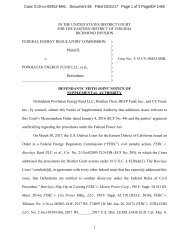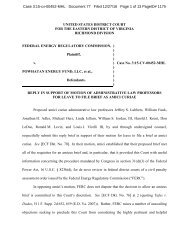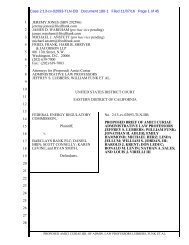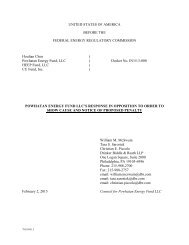FERC-Response-03-24-17
FERC-Response-03-24-17
FERC-Response-03-24-17
You also want an ePaper? Increase the reach of your titles
YUMPU automatically turns print PDFs into web optimized ePapers that Google loves.
Case 3:15-cv-00452-MHL Document 84 Filed <strong>03</strong>/<strong>24</strong>/<strong>17</strong> Page 18 of 30 PageID# 1437<br />
procedural paths, any penalty must be assessed by the Commission. See 16 U.S.C. §<br />
823b(d)(2)(A) (“the Commission shall assess the penalty, by order, after a determination of<br />
violation has been made on the record after an opportunity for an agency hearing pursuant to<br />
section 554 of title 5 before an administrative law judge”) (emphasis added) and 16 U.S.C. §<br />
823b(d)(3)(A) (“[i]n the case of any civil penalty with respect to which the procedures of this<br />
paragraph have been elected, the Commission shall promptly assess such penalty, by order”)<br />
(emphases added). The plain language provides that under both procedural paths the courts are<br />
authorized to “review” the Commission’s penalty assessment. Following that review, the district<br />
court, under Section 31(d)(3), is authorized to issue an order “affirming the assessment of the<br />
civil penalty” and “enforcing, modifying, and enforcing as modified, or setting aside in whole or<br />
in [p]art” the Commission’s penalty assessment. 16 U.S.C. § 823b(d)(3)(B). This language is<br />
consistent with appellate-style review, not with the adjudication of complaints in ordinary civil<br />
actions. See generally, ECF 39 at 9-21. Therefore, consistent with the doctrine of primary<br />
jurisdiction, Section 31(d) entrusts the Commission – prior to any court review – with bringing<br />
its expertise to bear in the first instance on any of the often abstruse questions implicated by a<br />
potential violation, and with ensuring industry-wide uniformity of interpretation prior to any<br />
judicial review. 9 This is fundamentally different from enforcement statutes, such as the<br />
Securities Exchange Act, 15 USC § 78u(d)(3), which require that courts, rather than the agency,<br />
9<br />
The Fourth Circuit Court of Appeals has found that primary jurisdiction does not apply where,<br />
in clear contrast to Section 31, “there is nothing in the section which contemplates that the<br />
Commission must first determine administratively whether the grounds of revocation exist.”<br />
Pennsylvania Water & Power Co. v. Consol. Gas Elec. Light & Power Co., 184 F.2d 552, 563<br />
(4th Cir. 1950) (emphasis added); cf., 16 U.S.C. §§ 823b(d)(3)(A) (“the Commission shall<br />
promptly assess such penalty by order”), 823(b)(d)(3)(B) (“If the civil penalty has not been paid .<br />
. . [t]he court shall have authority to review de novo the law and the facts involved”) and 825o-<br />
1(b) (“Such penalty shall be assessed by the Commission, after notice and opportunity for public<br />
hearing”) (emphases added).<br />
13






